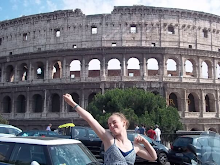Lo! In the orient when the gracious light
Lifts up his burning head, each under eye
Doth homage to his new-appearing sight,
Serving with looks his sacred majesty;
And having climb'd the steep-up heavenly hill,
Resembling strong youth in his middle age,
Yet mortal looks adore his beauty still,
Attending on his golden pilgrimage:
But when from highmost pitch, with weary car,
Like feeble age, he reeleth from the day,
The eyes, 'fore duteous, now converted are
From his low tract, and look another way:
So though, thyself outgoing in thy noon
Unlooked on diest unless though get a son.
My teacher asked us each to write down what we thought the poem meant. The vocabulary is old English so I didn't understand much of what Shakespeare was trying to say but I went for it anyways. I thought that the poem was talking about a god and him having a child because of clues like: 'Doth homage to his new appearing sight.' So I thought that could have been referring to a baby seeing for the first time. And also: 'Attending on his golden pilgrimage: But when from highmost pitch...' meaning a god sitting on a high throne or the god climbing his way up to success. The highmost pitch could have been a baby crying. At the end it says: 'Unlooked on diest unless though get a son.' To me, that meant that the god wanted a son really badly.
As I said earlier, today we split up into 3 separate groups. One was a group that had to act out what they thought it meant, one had to draw what they thought the poem described and my group had to use music to describe our opinions. It sounded really difficult at first because we couldn't say anything and all we could do was use instruments. But we decided to worry about that later and focused on what we thought it meant. There were two common ideas, one suggested that it was a god or a ruler of some sort and another group member suggested that maybe Shakespeare was talking about the sun. After I thought about that, it made perfect sense. I was convinced fully by lines such as: 'Lifts up his burning head' because the sun's head would be very warm and also: 'and having climb'd the steep-up heavenly hill.' I first thought that line meant metaphorically like climbing to success but I realized that the sun every morning "climbs" over the hills and higher and higher into the sky. And then I also realized the line: 'Like feeble age, he reeleth from the day'. That gave me a slight clue about how the sun then sets.
My idea has definitely changed about the poem from thinking it was about a child to the sun. The sun to me makes a lot more sense and I'm glad that my group partner brought that up because I had never thought that it could have been the sun.
I'll just have to wait and see the 2 other performances tomorrow and see if they change my mind!

2 comments:
to put it in a way i can explain and is understandable...i have NEVER thought about it that way! at first i thought and took the passage literally. i mean right now it could either be it about the sun and a smaller chance of this, i have never thought about this possibility
Riley, thanks for looking through the entire process and translating each line...that's a great way to start. The nuggets of your thoughts are there and you should explore them more in your next blog. Today's activity will help shine more light on the topic.
Post a Comment